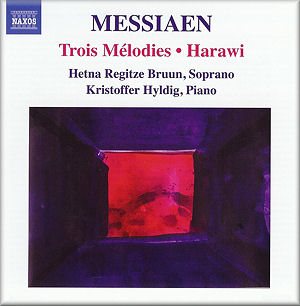 |
 |
|


alternatively
CD:
AmazonUK
AmazonUS
Download: Classicsonline
|
Olivier MESSIAEN (1908-1992)
Trois Mélodies (1930) [7:31]
Harawi (1945) [57:48]
 Hetna Regitze Bruun (soprano) Hetna Regitze Bruun (soprano)
Kristoffer Hyldig (piano)
rec. 5, 7, 8, 10 and 11 June 2009, Mantziusgården, Birkerød, Denmark.
 NAXOS 8.572189 [65:19] NAXOS 8.572189 [65:19] 
|
|
|
The Naxos roster of fine discs with vocal and other
music by Olivier Messiaen
is now graced with Harawi, one of the composer’s central works
for voice, and the earlier Trois Mélodies, written when the composer
was only 22.
Trois Mélodies is Messiaen’s musical response to the death
of his mother three years previously, and is full of tender melodic expression
and, aside from a passionate climax in the first Pourquoi? and the opening
of the last La fiancée perdue, restrained tonalities and dynamics
in the piano. The texts of the outer songs were written by Messiaen himself,
and the central song is on a poem by his mother. In the booklet notes David
McCleery points out the influence of Debussy in Messiaen’s earlier pieces. The pianistic
techniques indeed resonate with a longer tradition of French song which also
includes composers such as Fauré. Messiaen’s own compositional
language is by no means fully formed here, but these beautiful songs are a
perfect precursor
to one of the most potent song-cycles of the 20th century.
My experiences with Harawi began on the 10th of May 1990, when I had
the privilege of seeing it performed live at the IJsbreker in Amsterdam by
Yumi Nara
and Jay Gottlieb. Their recording appears on the Deutsche Grammophon ‘Complete
Edition’, though I am not sure if this is the same version as that with
the Accord label, on which I turned out to be less keen than the live performance.
Hetna Regitze Bruun and Kristoffer Hyldig are a powerful duo, and Hyldig certainly
pulls no punches. Bruun’s voice is recorded if anything with marginally
less presence than the piano, but isn’t swamped even through some of
the richer textures in the accompaniment, and the balance leaves room for her
own
dynamic range to reach its full potential without pushing the recording equipment
beyond its limits. Listen to the demanding Adieu on track 10 to hear
the soprano voice arc over the resonance of the piano in hair-raising style.
Harawi is a strange mixture of Messiaen’s extravagantly perfumed
tonalities, and the Peruvian traditional music which has its visual expression
in the striking cover to the published songs. The cycle is part of Messiaen’s ‘Tristan
trilogy’, whose members further include the Turangalila-symphonie and Cinq
Rechants. The vocal writing occasionally forays into regions unfamiliar
to the generally romantic feel of these ‘songs of love and death’,
with repetitious, almost instrumental statements such as the Doundou tchil of
the fourth song, intended to represent the ankle-bells worn by Peruvian dancers.
Messiaen doesn’t stray too far beyond his own more usual idiom however,
and gems such as Amour oiseu d’étoile always bring us back
to the composer’s familiar sublime magic. The composer’s own texts
are not given in the booklet, but almost more usefully, Erik Christensen provides
a description and narrative context for each song.
This is a mighty song-cycle, and requires commanding performances from the
musicians. The duo in this recording not only rise to the challenge, but excel
in communicating
its extremes of content, from vast landscape and fauna to folkloristic legend,
and more importantly of human emotion. Hetna Regitze Bruun’s range and
expressive power is remarkable, and only the coloratura turns which occur in
the Répétition planétaire seemed as if they might
have been a little less stiff. Harawi is a confrontation, an assault on
the senses - involving and rewarding in equal measure, but an exhausting labyrinth
nonetheless. Naxos has brought us a world class recording of this seminal vocal
repertoire, and at bargain price this is a release not to be missed by Messiaen
collectors.
Dominy Clements
|
|












